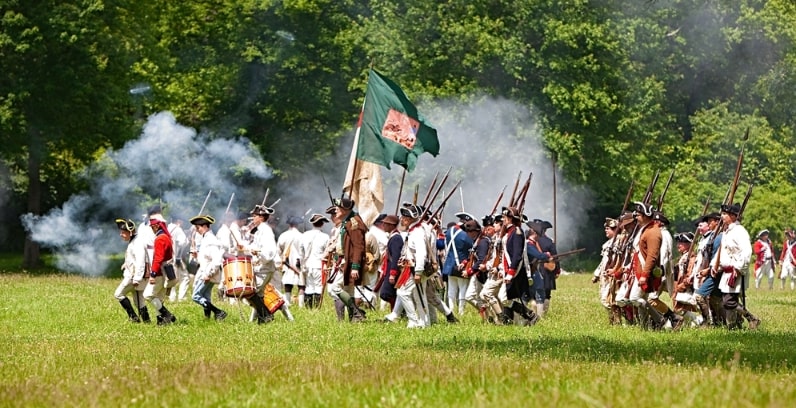Introduction: In this article – the second in a two-part series – Katie Rebecca Garner gives tips for researching your Revolutionary War-era ancestors. Katie specializes in U.S. research for family history, enjoys writing and researching, and is developing curricula for teaching children genealogy.
In the first article of this two-part series, we learned about what records the Revolutionary War generated for our ancestors. Now we will explore where we can find these records.

Photo credit: https://depositphotos.com/home.html
How to Find Revolutionary War Records
As mentioned previously, we want to start with what we know. What you know about your Revolutionary War ancestors may come from family sources, including family stories, artifacts, or papers. All of these are clues more than evidence. A family story could have been embellished – those embellishing the story may have wanted their ancestor to sound more heroic or less cowardly. Papers could be documentation about service or a story a grandchild wrote 100 years after the event. Artifacts could include the ancestor’s weapon that he took into the war with him.
Once you have gathered what you know, the next step is to see what others have researched. FamilySearch Family Tree is an excellent place to start this. With a free account, you can enter your ancestor’s information to find a profile. On the Sources page of the profile, you can examine the records other descendants have attached.
Looking up your ancestors on the websites for the Daughters of the American Revolution (DAR) and the Sons of the American Revolution (SAR) can also point you to research already done. For another descendant to join one of these societies, they had to prove the relationships of every generation between themselves and the ancestor and prove the ancestor’s service. It is important to note that an ancestor’s absence from either of these databases doesn’t necessarily mean they didn’t serve. It may mean that none of the descendants of that veteran have attempted to join the DAR or SAR.
Both websites for the DAR and SAR have ancestor databases that you can use to research veterans whose descendants are members. You can purchase applications to see the research these other descendants have done. Some of these applications include copies of the documentation.
When you are ready to expand into your own research, you will want to look up pension and bounty records, then service records. You can gain additional information by looking up unit histories and learning the historical context around the Revolutionary War.
Pension and bounty records will indicate your ancestor’s unit, which will be helpful in searching for service records and unit histories. If your ancestor did not have a pension, see if his neighbors did. Because units were organized at the county and town levels, men in the same unit tended to be neighbors. After identifying the neighbor’s unit, see if your ancestor was in that unit.
Another way to identify the unit is to look for newspaper clippings of Revolutionary War events published in your ancestor’s town. News of the war would have been published during the war, and veterans’ reunions would have been posted long after. If a veteran lived a long time, something might have been published about him as his birthday approached. Pay attention to the military units mentioned, then check those units for your ancestor. You can use GenealogyBank’s Historical Newspaper Archives for these searches.
Pension and bounty land records can be found on FamilySearch or the National Archives (NARA). Pension indexes include the veteran’s unit and application number, which can be used to request the full pension packet from NARA.
If your ancestor applied for bounty land, you may be able to find recourses in the FamilySearch Wiki land page for the appropriate state. Additional FamilySearch resources for Revolutionary War research can be found in the wiki and in the card catalog.
Photo credit: https://depositphotos.com/home.html
Learn More about the Revolutionary War
When researching your Revolutionary War ancestors, it is helpful to have an understanding of the historical context. There are many resources available to learn about the Revolutionary War-era in America. Here is a list of a few books:
- The Pictorial Field-Book of the Revolution; or, Illustrations, by Pen and Pencil, of the History, Biography, Scenery, Relics, and Traditions of the War for Independence, by Benson J. Lossing
- Encyclopedia of Continental Army Units: Battalions, Regiments and Independent Corps, by Fred Anderson Berg
- Forgotten Patriots: African American and American Indian Patriots in the Revolutionary War, by the DAR
- Historical Register of Officers of the Continental Army during the War of the Revolution, by Francis Bernard Heitman
Look up books specific to your ancestor’s state:
More Revolutionary War Records
Other places you can search for records of your Revolutionary War ancestors include Google, Wikipedia sites, war battlefields and reenactments, public libraries, university libraries, historical and genealogical societies, and newspapers.
Once you have records of your Revolutionary War ancestors, it is helpful to transcribe each record entirely.
This process isn’t always the most exciting, but it ensures that you catch each crumb of information. Important information can be overlooked when scanning records written in old cursive. You won’t miss anything when you transcribe the record, and this may be what is needed to break your brick wall. Also, your non-genealogist family members may be more open to seeing what you have found if they don’t have to struggle with the old cursive.
Celebrate freedom by learning about your ancestors who fought for it!
Explore over 330 years of newspapers and historical records in GenealogyBank. Discover your family story! Start a 7-Day Free Trial
Note on the header image: Revolutionary War flag. Credit: https://depositphotos.com/home.html
Related Articles:
- Genealogy Tip: Your Ancestor’s Revolutionary War Pension (part 1)
- Genealogy Tip: Your Ancestor’s Revolutionary War Pension (part 2)
- Genealogy Tip: Your Ancestor’s Revolutionary War Pension (part 3)
- Tips: Researching Your Revolutionary War Ancestors
Resources:
- https://familytreewebinars.com/webinar/u-s-revolutionary-war-a-case-study-approach/?category=records&subcategory=military&subsubcategory=revolutionarywar
- https://familytreewebinars.com/webinar/remote-research-in-the-databases-of-the-daughters-of-the-american-revolution-genealogical-research-system/?category=records&subcategory=military&subsubcategory=revolutionarywar
- https://familytreewebinars.com/webinar/revolutionary-war-series-1-of-5-the-revolution-more-than-just-the-war/?category=records&subcategory=military&subsubcategory=revolutionarywar
- https://familytreewebinars.com/webinar/revolutionary-war-series-2-of-5-the-participants-in-the-war/?category=records&subcategory=military&subsubcategory=revolutionarywar
- https://familytreewebinars.com/webinar/revolutionary-war-series-3-of-5-records-created-by-the-revolutionary-war-during-the-war/?category=records&subcategory=military&subsubcategory=revolutionarywar
- https://familytreewebinars.com/webinar/revolutionary-war-series-5-of-5-records-created-by-the-revolutionary-war- after-the-war-bounty-land/?category=records&subcategory=military&subsubcategory=revolutionarywar&sortby=newest
- https://www.familysearch.org/rootstech/session/remembering-the-black-patriots-of-the-american-revolutionary-war
- https://www.familysearch.org/rootstech/session/african-americans-in-the-revolutionary-war-war-of-1812
